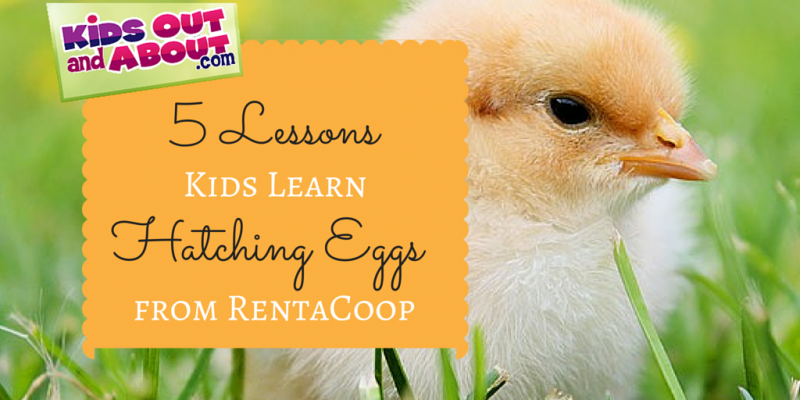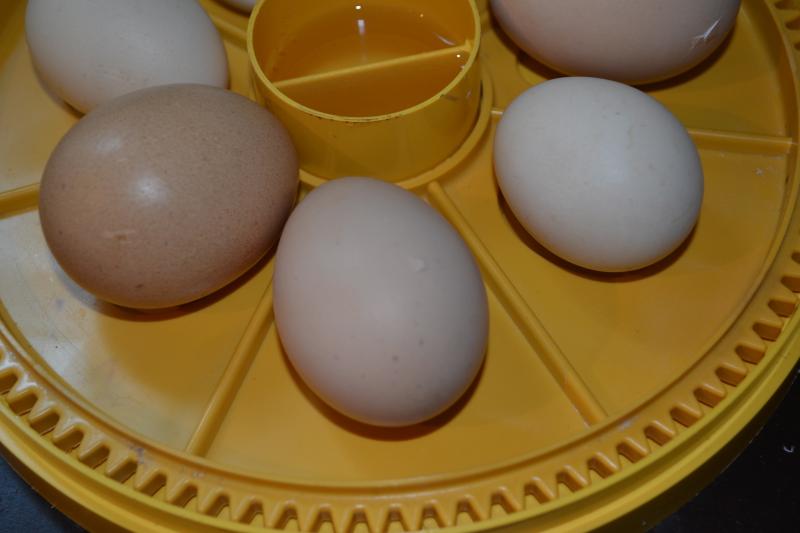Five Lessons Kids Learn From Hatching Eggs with RentaCoop

Remember in second grade when your class incubated duck eggs and watched them hatch? Remember how incredible that was? Yet your kids may not get the same experience in school. If you're concerned about schools cutting "extras" in favor of more test practice or if you're homeschooling your kids, RentaCoop offers this amazing science lesson at home, all supplies included. KidsOutAndAbout teamed up with RentaCoop to show just how much kids (and parents) can learn from the miraculous and miraculously easy process of incubating and hatching chicken eggs in your own home.
The Basics
RentaCoop sends you everything you need: incubator, eggs, brooder, chicken feed, water and food dispensers, bedding, heat lamp, everything. You place the eggs in the incubator and plug it in. The machine will rotate the eggs itself and count down to hatch day. After 21 days, look for the pip in the shell and watch those babies being born. After allowing them to rest a bit, tranfer them to the brooder and enjoy their first few weeks of development. After which you can keep them for egg laying in your own backyard (RentaCoop can help you with this as well) or find them a good home on a local farm.
My intention in signing up for the program was to simply show my kids how oviparous animals are born. I should have known the experience would be so much more enriching than just a science lesson.
1. Well, here’s the obvious one: the life cycle of a chicken.
Of course, my main objective in partaking in this project was for my kids (ages 1 and 4) to have a science lesson in the life cycle of an animal. Following a hatching calendar, we were amazed to learn that there was something new developing in the egg every day.

Here are some of the resources we used to enhance the learning experience.
Chicken Chick.com - Backyard chicken blog, everything you need to know from hatching to raising
2. Patience
The chicks hatch at 21 days like clockwork. In fact, the incubator works like a Ronco machine – set it and forget it. Put the hatch day on your calendar because they will hatch exactly on that day. But the 21-day incubation is not the only wait time. Even when we saw the first pip in each egg we still had to wait a few hours for the chick to fully hatch. It was like watching television the way we sat around the incubator cheering on the tired little ones as they mustered their strength for the next big push. I filled the wait by telling stories of my kids’ births.
3. Responsibility
The cage needed occasional cleaning. The water and food needed to be filled. But after only a few weeks of owning them, the chicks were given to a farm. This was an excellent intro into the idea of having a pet. My kids are young, and we’re not sure yet if they’re ready for the big time responsibility of a permanent pet like a dog. Knowing that this was a temporary situation and required relatively low maintenance was a good first foray.
4. Hygiene
Getting small children to wash their hands regularly and to cover their sneezes is a chore. But our rule was that you could not handle the eggs (for candling them) or the chicks unless you washed your hands before and after your visit. Hah – you’ve never seen kids run so fast to the bathroom sink!
5. Loss
It was terrible. One chick never quite got up on his feet and we dubbed him Floppy for the way he “swam” about the brooder. Though we tried to keep food and water within easy reach, even attempting to handfeed him, the poor thing just couldn’t make it. Unfortunately this meant having a tough conversation with my four-year-old that part of the life cycle of any animal means death, sometimes death at a young age. We buried him in our back yard. Warning: There is a possibility some of your eggs may not hatch or that young chicks may die. Be prepared to incorporate it into your learning experience.
After a two weeks of watching our chicks grow, it was time to find them a lifetime home. You are welcome to keep your chicks (Rentacoop has the supplies to set up your own coop in the backyard), but check with your town ordinances. Our town does not allow backyard chickens. Luckily, it was incredibly easy to find a home for them on Craigslist. In fact, within minutes of posting them, we had a flood of inquiries. We were able to choose the best home for them - a family farm just down the road from us where we now get farm-fresh eggs delivered to us from the very chicks we hatched ourselves!
© 2015, KidsOutAndAbout.com
Kathleen McCormack is editor of KidsOutAndAbout.com and lives in the Rochester, NY area. Her eternally patient husband is used to her hatching new ideas like "Let's get chickens!"

